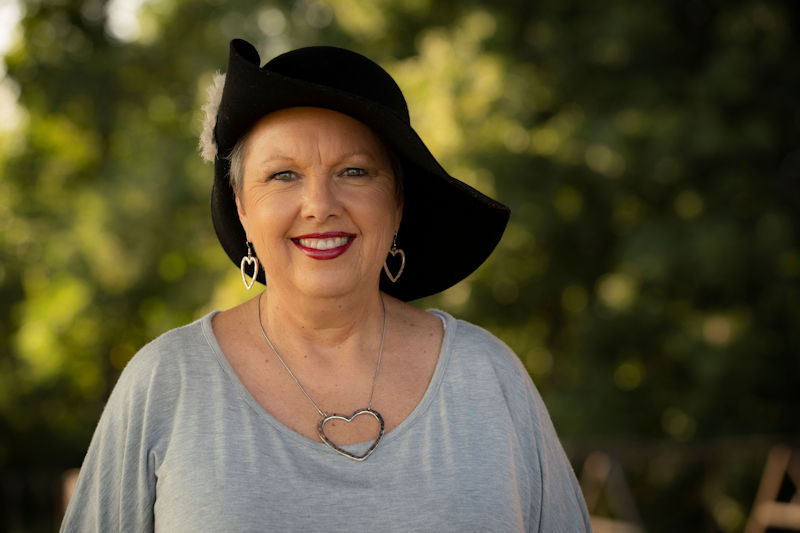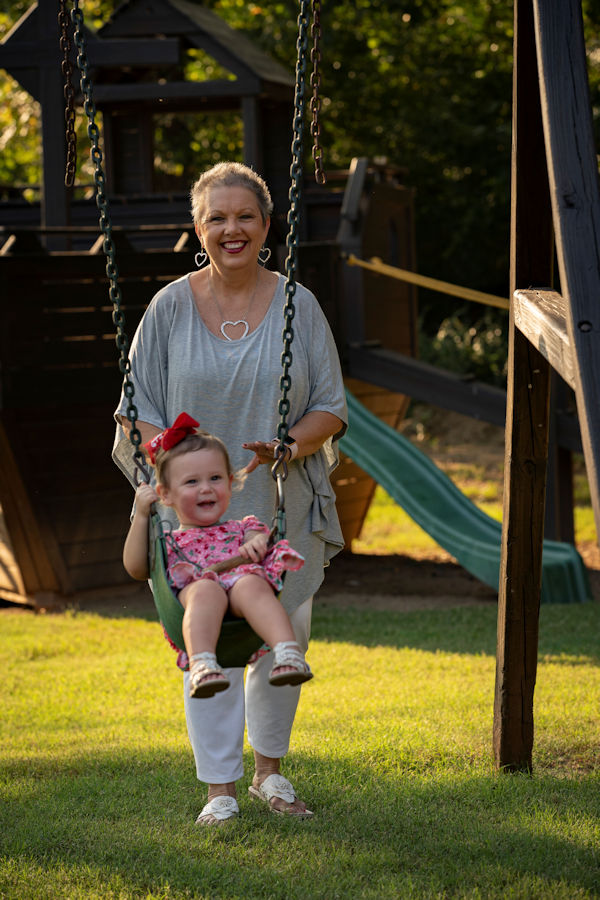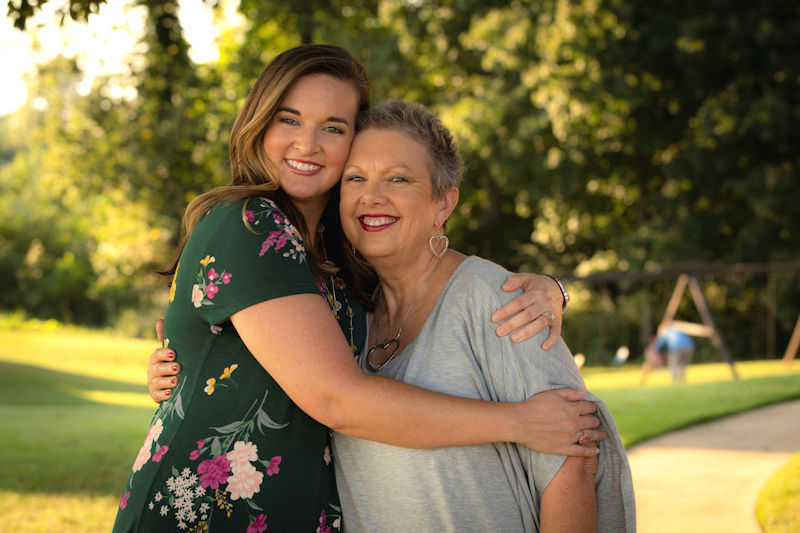Last winter, you might have spotted Sharon Campbell Easter wearing a colorful, handmade crochet hat.
After undergoing chemotherapy to treat breast cancer, she lost her hair and faced the decision of wearing a wig or surrendering her style. She chose neither.
“I chose not to do a wig,” said Easter, a paraprofessional at Woodland High School and a resident of Randolph County, Alabama. “I just got some crochet hats, some ball caps and put some bling on them.”

She got many of them from her doctor’s office. The hats were crocheted by the Shiloh Stitchers, a group of women from Shiloh United Methodist Church in Carrollton and the community who meet weekly to make handcrafted items, which includes caps for cancer patients.
“I have multiple colors,” Easter said. “When I was sitting during my treatment, they would bring in these Rubbermaid containers full of hats and they’d let me pick out which ones I wanted. It was like Christmas.”
Even though she retired her crochet hats this past summer, they may make a comeback this winter.
“She was very fashionable with her hats,” said Easter’s sister, Tanya Messer, who has been one of her biggest supporters.
For Easter, wearing hats became more than a fashion statement — they became a symbol of strength, courage and the comfort she received from loved ones after being diagnosed with breast cancer last September. Prior to her diagnosis, she regularly received routine screenings and never had any health problems, so it was a complete shock when she was called back for a diagnostic mammogram after receiving a screening mammogram aboard Tanner’s “Mammography on the Move” mobile mammography unit in Woodland, Alabama.
“One day at school, my husband (Steve) called and he said, ‘You’ve had a phone call from the doctor,’” Easter said. “I was like, ‘What doctor? I hadn’t been to the doctor,’ and he said, ‘I think it’s about your mammogram.’ Sure enough, I called and they said something was different.”
Messer accompanied her when she went to Tanner Breast Health for the diagnostic mammogram. Their mother, who passed away in 1982, had kidney cancer. But no one in her family ever had breast cancer. After the diagnostic mammogram, she was referred to Raul Zunzunegui, MD, FACS, to set up an appointment for a biopsy. Dr. Zunzunegui, who encourages his patients to call him “Dr. Z,” is a Susan G. Komen Fellowship-trained, board-certified surgeon who specializes in breast surgery.
“They didn’t officially tell me it was cancer until after the biopsy — just that something was there,” Easter said. “But I knew before. I just had a feeling. But I also knew everything was going to be OK.”
After the biopsy, Dr. Zunzunegui called her at home to give the results: she had stage 2 triple positive or HER2-positive breast cancer.
“The biopsy gave us invaluable information to help us plan the most effective treatment,” said Dr. Zunzunegui. “We knew how far the cancer had spread and which medications would work best to fight the cancer, so we could get Ms. Easter started on the right treatment, right away.”

While Easter hasn’t shed a tear over the diagnosis, she tears up when she talks about the support she has received throughout the process. That support included a Facebook friend who texted her every day.
“She would text me every day and say, ‘I’m praying for you,’” Easter said. “She has not missed a day and she is battling her own health issues.”
She has another friend, a local nurse, who has also been by her side and offered her advice on what vitamins to take. Soon after her diagnosis, she began receiving neoadjuvant chemotherapy, which is administered before surgery. Her first treatment was a few days before Thanksgiving.
While she didn’t get sick after her first treatment, she did have to go to the emergency department to be treated for dehydration the day before Thanksgiving.
“I had let myself get dehydrated, but after that, I just guzzled water down like it was medicine,” Easter said.
She continued chemotherapy treatments every three weeks and completed her last treatment on March 6. She’s also taking a year-long course of Herceptin, an effective treatment of early-stage breast cancer.
Easter noted that her patient care team said they would have told her 20 years ago to get her affairs in order because HER2-positive breast cancer spreads directly to the brain — but treatment has come a long way since then.
She later had a lumpectomy and sentinel node biopsy to determine if the cancer had spread beyond the primary tumor.
“I had a lumpectomy, they took out two lymph nodes and everything was clear,” Easter said. “I started radiation in April and had 35 rounds. My last one was June 19.”
Now she is in remission and has nothing but good things to say about her medical team, which consists of Dr. Zunzunegui; Bradley Larson, MD, an oncology and hematology specialist at Northwest Georgia Oncology Centers in Carrollton and a member of the patient care team at Tanner Cancer Care; James Richard Bland, MD, a radiation oncologist at Tanner Radiation Oncology; physician assistant Mary Beth Maxwell, PA-C, as well as breast cancer nurse navigator Nicolle Rooks, RN, MSN, and outpatient dietitian Holly Garner, RD, LD.
“During my first few visits with Dr. Z and Dr. Larson, they were talking to me but I wasn’t really sure what they were saying, so I would just listen and listen and then I would call Nicolle,” Easter said. “She would visit me after treatment, sit with me for a few minutes during treatment and call a day or two later to check up on me. It’s just unreal how good people are.”
Through it all, it’s the support of her family and friends that makes each day on her cancer journey a little easier. Her support system at home includes her sister, husband and daughter, Molly (pictured above).
“We have a granddaughter (pictured at right) that’s a year a half now,” Easter said.
A member of Bethel East Baptist Church in Woodland, Alabama, she is thankful for the support of her church family, which includes Pastor Keith Runels and his wife, Angie, who owns a monogram boutique called Lexi Lou’s. When Easter told her she needed a ball cap, Angie Runels provided her with three — each with a personalized touch.
Since Easter is from Woodland, one cap was in her school’s colors — orange and blue. Another cap was an ode to her favorite college football team.
“I’m an Alabama fan so she did the crimson and white,” Easter said.
The third cap was black and white.
While going through treatment, she continued to work at the school even during flu season, which can present special risks for immunocompromised people undergoing cancer treatment.
“My superintendent said, ‘We don’t want you exposed,’ so they allowed me to sit in the corner and do paperwork — grade papers,” Easter said. “The students at the time knew I was trying to avoid the flu and they would wave at me from a distance.”
She also continued to teach her Sunday school class. She admits that she got up a lot of mornings thinking she could conquer the world. But by lunch, she would feel a little tired and have to rest. That didn’t stop her keeping up with her daily routine though, which included walking on the treadmill.

“I come from a line of fighters,” Easter said.
Her sister agrees.
“She’s really done great,” Messer said. “Our mother went through chemo in the ‘70s. She died in ‘82 and we remember how terrible it was. Now, we see how far they’ve come with treatment. I attribute her [Easter] doing so well to all the research that has been done.”
Not one to shy away from sharing her story, Easter was honored on March 3 at Randolph County’s third annual Bingo for Boobies event benefitting Tanner Foundation’s Mammogram Assistance Fund. She spoke to attendees about her experience as a breast cancer survivor. Over the last three years, the event has raised thousands of dollars to provide lifesaving mammograms for local women who couldn’t otherwise afford one.
Her advice to women who may be apprehensive about getting a mammogram or don’t have the money to pay for it?
“Do it,” Easter said. “Mine was done through the mobile unit. There is no reason — no reason — not to have it done. And if they do get the diagnosis like I did, it’s not a death sentence. I wouldn’t be here. I wouldn’t be able to share this. I wouldn’t be able to witness to other women. I wouldn’t be able to let them know that it’s not a death sentence. It’s just a little bump in the road.”